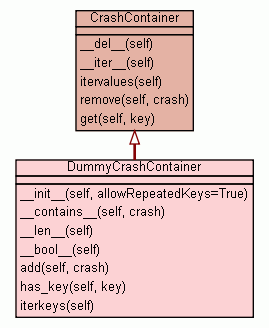
| Home | Trees | Indices | Help |
|
|---|
|
|

Fakes a database of volatile Crash objects, trying to mimic part of it's interface.
See Also: Crash.key
|
|||
|
|||
| bool |
|
||
| int |
|
||
| bool |
|
||
|
|||
| bool |
|
||
| iterator |
|
||
|
|||
| iterator |
|
||
| Crash object. |
|
||
| iterator |
|
||
|
|||
|
Inherited from |
|||
|
|||
|
Inherited from |
|||
|
|||
Fake containers don't store Crash objects, but they implement the interface properly. |
|
|
|
Adds a new crash to the container.
Note:
When the See Also: Crash.key |
|
See Also: get Warning: A copy of each object is returned, so any changes made to them will be lost. To preserve changes do the following:
|
| Home | Trees | Indices | Help |
|
|---|
| Generated by Epydoc 3.0.1 on Fri Feb 12 19:46:17 2010 | http://epydoc.sourceforge.net |